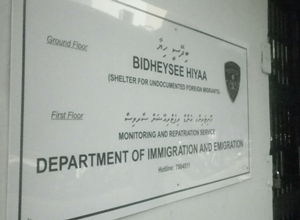An immigration shelter intended to temporarily house unregistered and illegal immigrants is now up and running in Male’ as part of the government’s efforts to provide a more “humane” means of tackling immigration problems in the country.
Authorities have so far declined to provide exact details to media on the capacity or amenities available at the site, which the Maldives government has claimed will help to alleviate problems arising from the number of unregistered workers in the country at present.
With civil society, industry bodies and international experts continuing to raise concerns about the treatment and number of unregistered foreign workers in the Maldives in recent years, the country has come under increasing pressure to safeguard rights of migrants and curb people trafficking.
The Maldives has appeared on the US State Department’s Tier Two Watch List for Human Trafficking for three years in a row. Should it drop to tier three – the worst category- then the country is expected to face significant reductions in aid and potential travel restrictions on its citizens.
According to President’s Office Media Secretary Masood Imad, the immigration shelter, which was opened last month on Orchid Magu in Male’, forms part of a strategy to try and clear up the problems associated with illegal immigrants in the Maldives.
Masood contended that illegal or unregistered migrant workers were proving to be a significant drain on the national economy, with the shelter providing temporary accommodation before they can be repatriated.
The President’s Office recommended specific questions on the shelter be forwarded to the Department of Immigration and Emigration.
Immigration Controller Dr Mohamed Ali has confirmed to Minivan News that the site was now operational, but did not divulge any more information at time of press on how it would function or the facilities available.
“We will bring out a statement later,” he said. Minivan News is presently awaiting a response from immigration officials to a request to visit the shelter.

The government has in recent months launched a special campaign intended to raising awareness of the rights of foreign workers, while also last month ratifying eight “fundamental” International Labour Organisation (ILO) conventions intended to bring legislation on employee rights and trade unions in line with international standards.
However, independent institutions in the Maldives have maintained that the country is yet to ratify a core convention on protecting migrant worker rights, while no legislation is in place to punish those involved in smuggling workers though the country’s borders.
The Prosecutor General (PG’s) Office has also confirmed that a lack of legislation has meant no cases have been prosecuted against human traffickers in the Maldives at present.
“Corrupt immigration practices”
Just last month, a Maldivian trade union alleged that corrupt immigration practices and the use of unregulated employment agencies by private and state employers was limiting efforts to curb abuse of migrant workers and prevent illegal practices such as retaining their passports.
The Tourism Employees Association of Maldives (TEAM) claimed that while companies are not permitted to retain the passports of foreign workers, some hospitality operators – as well as unregulated third party agencies and government ministries – are still keeping employee travel documents without consent.
At the same time, a source with knowledge of the current immigration system told Minivan News that the practice of retaining passports – a long-standing habit of Maldivian employers – was a key contributor to human trafficking in the country.
“This is a common practice seen all over the world. But it creates major problems. If a foreigner wishes to go to law enforcement agencies for assistance, they will be asked to identify themselves with a passport,” the source said.
Third party agencies appeared to want to keep the passports to be able to “manipulate” foreign workers for their own financial advantage, the source explained.
Consistency
Meanwhile, the Human Rights Commission of Maldives (HRCM) has accused state and private sector employers in the country of lacking consistency in their efforts to address human trafficking, preventing “real” change in controlling illegal migration.
Speaking back in February 2013, HRCM member Jeehan Mahmoud told Minivan News that despite attempts under the present government to try and introduce new legislation, the Maldives had made little progress towards improving the treatment and rights of foreign workers over the last four years.
Addressing the current scope of unregistered foreign labour, Maldives Association of Construction Industry (MACI) President Mohamed Ali Janah said an estimated 40 percent of the foreign employees in the sector were thought not to be legally registered.
Considering these numbers, Janah said he could not rule out the involvement of organised crime in certain employment agencies, which supply a large amount of foreign labour to building sites in the Maldives.